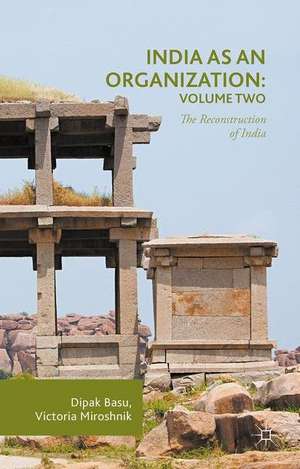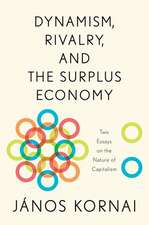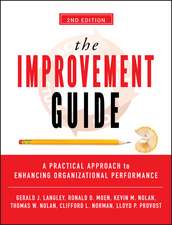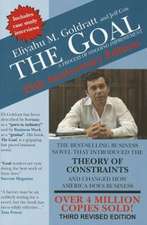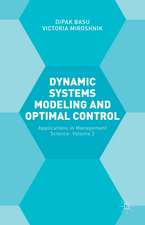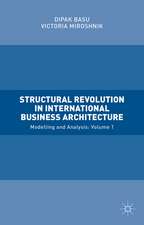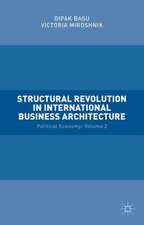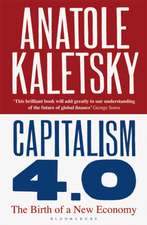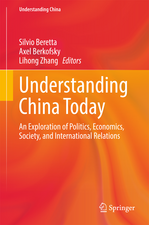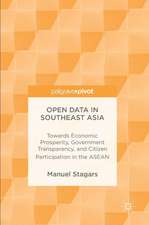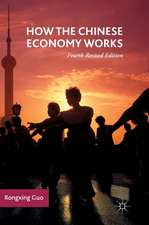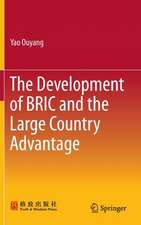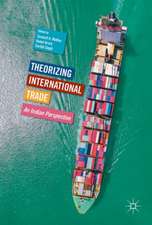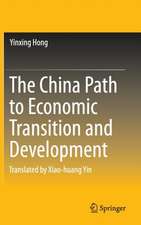India as an Organization: Volume Two: The Reconstruction of India
Autor Dipak Basu, Victoria Miroshniken Limba Engleză Hardback – 18 oct 2017
Chapters consider the stresses placed on India’s organisation by the shocks of the twentieth century, from its experiments with a socialist economy to its embrace of the Washington consensus in the 1980s. The impact of the invasion of China in 1962 and India’s struggle to find its feet post-partition are also given detailed analysis. The book’s unique perspective helps to shed light, for the first time, on how India’s organisational structure negotiated the country’s immense historical and cultural inheritance with the stresses of a twentieth century nation state.
| Toate formatele și edițiile | Preț | Express |
|---|---|---|
| Paperback (2) | 573.48 lei 38-44 zile | |
| Springer International Publishing – 14 aug 2018 | 573.48 lei 38-44 zile | |
| Springer International Publishing – 13 mai 2018 | 636.12 lei 6-8 săpt. | |
| Hardback (2) | 639.25 lei 6-8 săpt. | |
| Springer International Publishing – 18 oct 2017 | 639.25 lei 6-8 săpt. | |
| Springer International Publishing – 16 aug 2017 | 641.38 lei 6-8 săpt. |
Preț: 639.25 lei
Preț vechi: 752.06 lei
-15% Nou
Puncte Express: 959
Preț estimativ în valută:
122.33€ • 125.28$ • 101.76£
122.33€ • 125.28$ • 101.76£
Carte tipărită la comandă
Livrare economică 19 martie-02 aprilie
Preluare comenzi: 021 569.72.76
Specificații
ISBN-13: 9783319533681
ISBN-10: 3319533681
Pagini: 151
Ilustrații: XIII, 180 p. 2 illus.
Dimensiuni: 148 x 210 mm
Greutate: 0.39 kg
Ediția:1st ed. 2017
Editura: Springer International Publishing
Colecția Palgrave Macmillan
Locul publicării:Cham, Switzerland
ISBN-10: 3319533681
Pagini: 151
Ilustrații: XIII, 180 p. 2 illus.
Dimensiuni: 148 x 210 mm
Greutate: 0.39 kg
Ediția:1st ed. 2017
Editura: Springer International Publishing
Colecția Palgrave Macmillan
Locul publicării:Cham, Switzerland
Cuprins
1. Second Turning Point: Planning and Reforms.- 2. External Risk: Competitors and Rivals.- 3. Internal Risk: Weakness of the Organization.- 4. Conclusion.
Notă biografică
Dipak Basu is currently Emeritus Professor in Nagasaki University and professor in Finance in Tohoku University Graduate School in Tsuruoka, Japan. Previously he was Lecturer at the Institute of Agricultural Economics of Oxford University, Research Officer in the Department of Applied Economics of Cambridge University, Senior Economist in charge of the Middle East & Africa division of Standard & Poor, and Senior Economist in the Ministry of Foreign Affairs of Saudi Arabia. He was awarded Honorary Doctorate from Nagasaki University. He has received his PhD from the University of Birmingham.
Victoria Miroshnik is currently Professor in Management in Reitaku University, Tokyo. Previously she was Associate Professor in the American University Dubai, Ritsumeikan Asia Pacific University in Japan, and Keimyung University in South Korea. She was awarded the Adam Smith Research Fellowship from the University of Glasgow. Her previous books are Corporate Culture in Multinationals and Organizational Culture and Commitment. She has received her PhD from the University of Glasgow.
Victoria Miroshnik is currently Professor in Management in Reitaku University, Tokyo. Previously she was Associate Professor in the American University Dubai, Ritsumeikan Asia Pacific University in Japan, and Keimyung University in South Korea. She was awarded the Adam Smith Research Fellowship from the University of Glasgow. Her previous books are Corporate Culture in Multinationals and Organizational Culture and Commitment. She has received her PhD from the University of Glasgow.
Textul de pe ultima copertă
This book, the second of two volumes, continues the authors’ ground-breaking re-examination of India’s history and political economy. Using the novel perspective of analysing India as an organization, volume two closely considers the country’s fortunes in the twentieth century and how the country’s history and political economy have been brought to bear on its functioning. This volume describes the economic fortunes of India in the second half of the 20th century. Beginning with the reconstruction of the Planning Commission and India's hybrid model of economic planning, the authors describe the multiple shocks weathered by the system before being replaced with a fully free market model after the collapse of the Soviet Union.
Chapters consider the stresses placed on India’s organisation by the shocks of the twentieth century, from its experiments with a socialist economy to its embrace of the Washington consensus in the 1980s. The impact of the invasion of China in 1962and India’s struggle to find its feet post-partition are also given detailed analysis. The book’s unique perspective helps to shed light, for the first time, on how India’s organisational structure negotiated the country’s immense historical and cultural inheritance with the stresses of a twentieth century nation state. The authors consider what lessons can be drawn from India's successes and failures at aligning its goals and organisations with its heritage and mission
Chapters consider the stresses placed on India’s organisation by the shocks of the twentieth century, from its experiments with a socialist economy to its embrace of the Washington consensus in the 1980s. The impact of the invasion of China in 1962and India’s struggle to find its feet post-partition are also given detailed analysis. The book’s unique perspective helps to shed light, for the first time, on how India’s organisational structure negotiated the country’s immense historical and cultural inheritance with the stresses of a twentieth century nation state. The authors consider what lessons can be drawn from India's successes and failures at aligning its goals and organisations with its heritage and mission
Caracteristici
A groundbreaking re-examination of India's history and political economy Covers a wide scope of Indian hisotry Looks at the stresses stresses placed on India’s organisation by the shocks of the twentieth century
